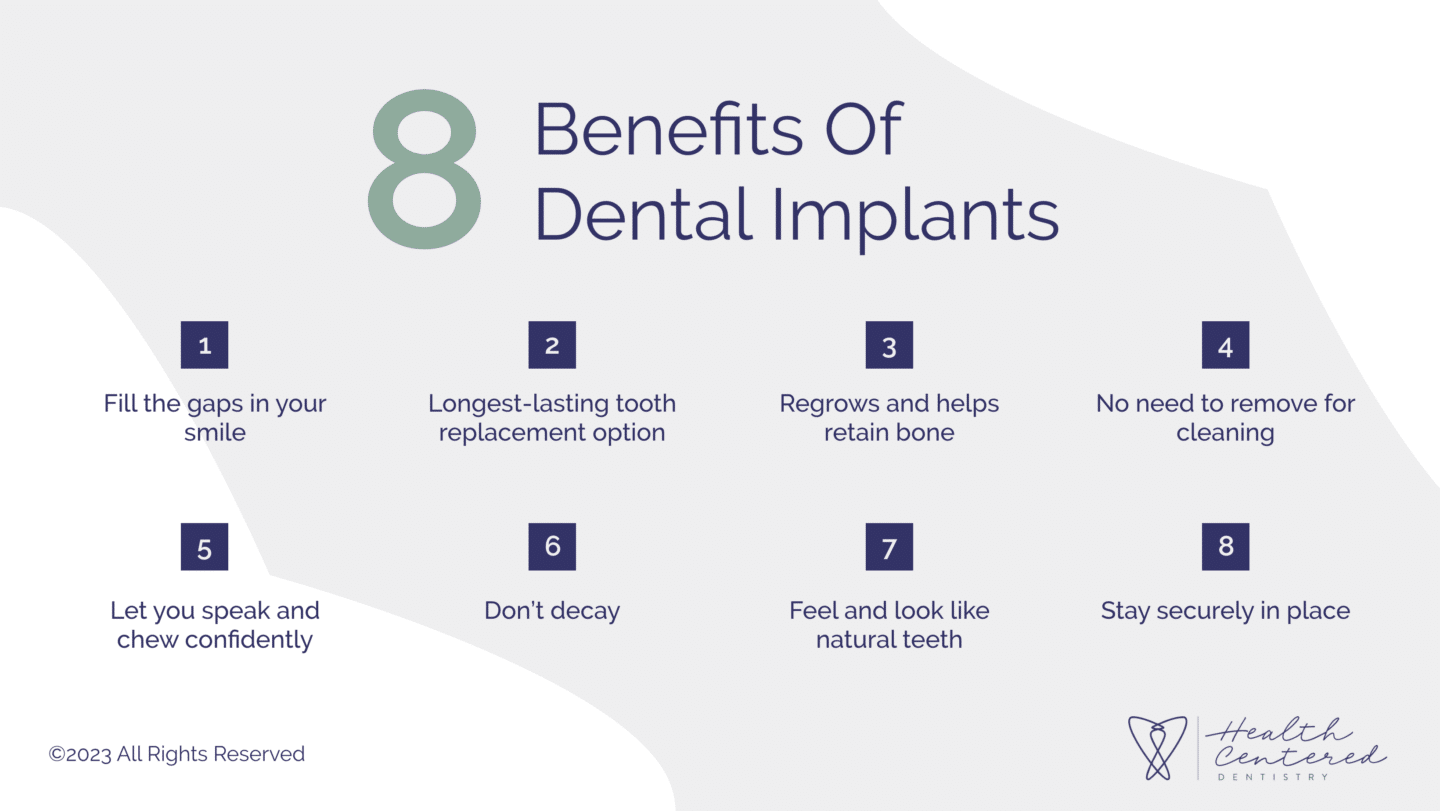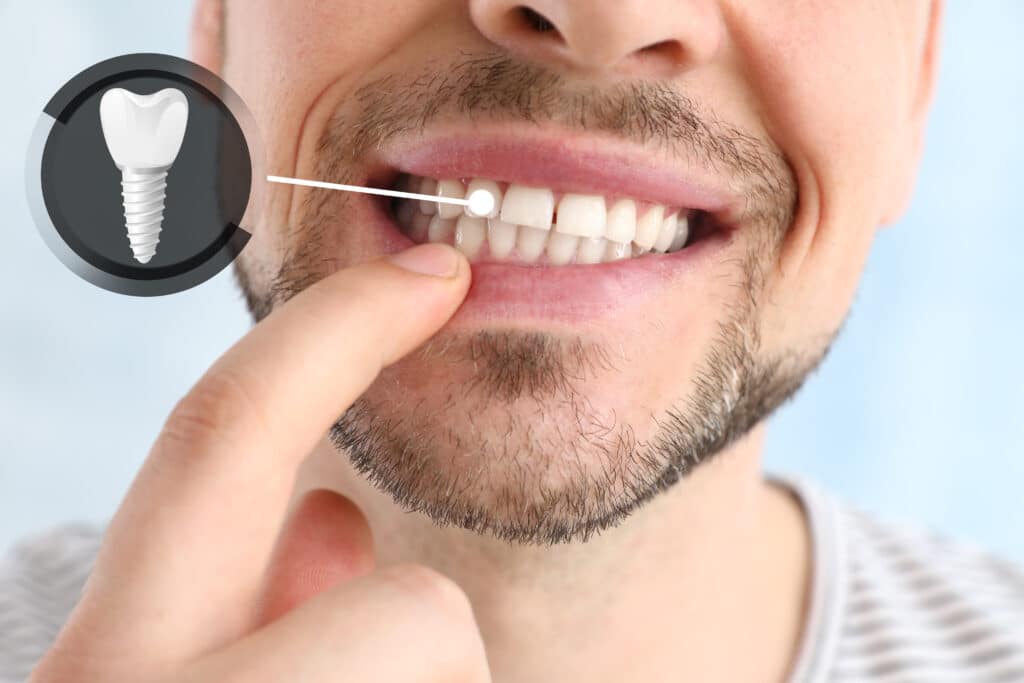For many people, the idea of getting dental implants seems like a dream. Imagine tooth replacements that look like your natural teeth and remain secure and functional for years. To help you make the leap from fantasy to reality, here’s an overview of dental implants, their benefits, and the procedure.
Would you like to know how dental implants can work for you? Schedule a consultation at Health Centered Dentistry!
What Are Dental Implants?
Dental implants offer a long-lasting method for replacing missing teeth. The implant is a titanium screw that your dentist attaches to your jawbone. Titanium is typically used because this metal bonds easily with bone. Zirconia can also be used. The implant makes a sturdy replacement for the tooth root. Atop the implants, your dentist adds an abutment that provides the connection between the implant and the artificial tooth or denture.
Getting Started with Dental Implants
If you’re interested in having dental implants, talk to a dentist with expertise in placing them. At Health Centered Dentistry, our dentist has extensive knowledge and experience with various types of restorative dentistry, including dental implants.
Your journey begins with a consultation with your dentist. They examine the current condition of your mouth, jawbone, gums, and any remaining teeth using visual examination and digital x-rays. If you are a good candidate for dental implants and choose to have them, the next step is creating a treatment plan and setting up an appointment for dental implant surgery.
The Dental Implant Procedure
Placing dental implants is a type of oral surgery that usually requires at least two surgical visits. During the first visit, your dentist surgically inserts the implant into your jawbone. Over the next two months, the implant fuses with the jawbone. We use a computer-guided surgical method to insert the implant precisely how it needs to go.
The exact procedure varies from person to person. Your dentist will consider the following factors in planning the procedure:
- The type of implant
- Where the implant will be inserted
- The condition of your jawbone
During the consultation phase, your dentist creates a treatment plan that takes all these factors and more into account.
Some of the steps your dentist might include in this plan could include:
- Removing a damaged tooth
- Preparing the jawbone with grafting if needed
- Inserting the implant
- Allowing time for the bone to grow and heal
- Placing the abutment and then the artificial tooth
When the healing process is complete, you’re ready for your second appointment, where your dentist attaches the abutment and then a crown. With the help of innovative dental technology, your dentist may be able to place the implant and the artificial tooth or crown in one appointment. Placing the abutment is minor surgery. Your dentist opens your gums, places the abutment, and closes the gum tissue around the abutment.
Whether you can have same-day implants is a determination that you and your doctor make based on your oral health condition and other factors. At HCD, we look forward to answering any other questions you have on dental implants.
Dental Implant Aftercare
Since placing dental implants is a surgical procedure, you might choose sedation dentistry. In that case, you need someone to drive you home from the visit. If you have a local anesthetic instead, getting a ride home is less important.
Deal with Side Effects
After you arrive home, you may need to deal with some side effects of the procedure. You might notice some swelling and discomfort. The pain can be solved with an over-the-counter pain reliever, some of which also help with the swelling. This should last, at most, a few days after the procedure. Your saliva may appear blood-colored, and this is normal. However, if the bleeding doesn’t go away after the first day, it’s critical that you call your dentist to get instructions on how to manage it.
Follow Your Dentist’s Instructions
Be sure to follow all your dentist’s instructions. If they’ve given you antibiotics to take after the procedure, be sure to take them faithfully until they are gone. This will help prevent infection and avoids implant failure.
Choose Foods and Beverages Carefully
After your implant is fully healed, you will be able to eat and chew normally. However, in the first three to four days, you should be a little careful, avoiding hot liquids, spicy foods, and hard foods. For that time, stick to soft, mild foods.
Practice Good Oral Hygiene
Your oral hygiene is always important, especially so after dental implant surgery. At the same time, you’ll want to avoid scrubbing vigorously for a while. On the first day, brush and floss carefully, but don’t rinse your mouth. The next day, you can follow your usual dental hygiene routine, rinsing with warm salt water a few times a day. To avoid interfering with the healing process, clean around the area with a Q-Tip instead of a toothbrush.
Other Recommendations
Your dentist may also recommend that you quit smoking for at least the first two weeks. They may also suggest and provide a bite guard if you have bruxism. In addition, they may make suggestions based on unique factors you’ve discussed with them. Remember that your dentist is your implant expert!
Benefits of Dental Implants

Today, millions of people in the U.S. already have dental implants. Why? There’s a good reason that dental implants are becoming more popular every year – several reasons, actually. That is, they have numerous excellent benefits. Dental implants do all of the following:
- Restore your smile by filling any gaps caused by missing teeth.
- Designed to last a lifetime, they last longer than other tooth replacement options.
- Help regrow and retain the bone that supports your teeth.
- Clean up easily without you having to remove them.
- Help you speak and chew more confidently.
- Don’t decay.
- Feel and look like natural teeth.
- Implants stay put, and the artificial teeth attached to them don’t slip out, either.
When deciding whether to get implants, it’s best to talk to your dentist about your goals. Whether you’re concerned about your appearance, overall health, or ability to chew and speak normally, dental implants may be the best option for you.
Where to Go for Dental Implants in Anchorage
At Health Centered Dentistry, we provide holistic dentistry in Anchorage to help you achieve a beautiful smile and overall health at the same time. We understand how your beautiful smile boosts your self-confidence. We know that having a full set of teeth can improve your general health and emotional well-being. What’s more, we want to help you avoid pain and discomfort by providing expert dental care.
Getting dental implants in Anchorage is no problem when you seek care from an excellent dental care professional. At Health Centered Dentistry, we take a whole-body approach to natural dental care. Not only do we provide dental services to the highest standards, we also follow through with continuing care throughout the process. Dental implants are popular because of their many benefits, but to get the best results, you need a dental care pro. You can find your most radiant smile when you come to Health Centered Dentistry for dental implants in Anchorage!
Is it time to do something positive about your missing teeth? Talk to our expert dental team at Health Centered Dentistry today!


